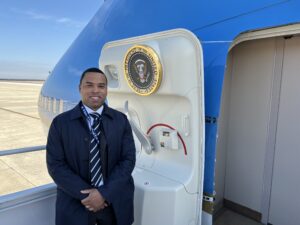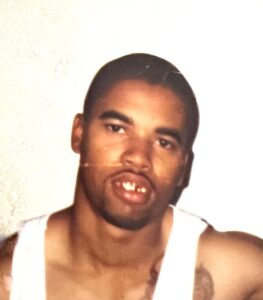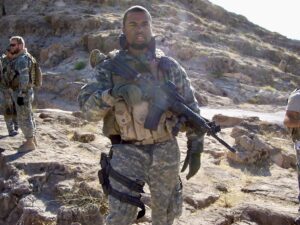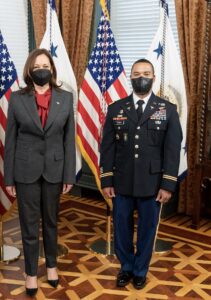Bernard Toney Jr.: How a Troubled Youth Transformed his Life as a PA
Bernard Toney Jr., DMSc, MPH, PA-C leads a life and career of service to others
September 29, 2023
By Dorsey Griffith

Much of Bernard Toney Jr.’s young life was marked by what he calls “an intentionality with respect to failure.” It was near impossible during his years in middle school, high school, and even early career in the U.S. Army to imagine a life devoid of failure. However, in the years that followed, he defied all odds and surpassed everyone’s expectations, including his own.
Toney went on to achieve remarkable academic success, earning two bachelor’s degrees, a master’s in physician assistant studies, a master’s in public health, an associate degree in French and, most recently, a doctorate in medical science. At the age of 42, his professional journey has proved equally impressive, encompassing 21 years of dedicated service in the Army, PA service at the White House and National Institutes of Health and an adjunct professor position at University of Lynchburg in Virginia. In late September, Toney embarked on a new chapter, assuming a position as a public health and medical planner with the U.S. Department of Homeland Security, further solidifying his exceptional career trajectory.
An Early Opportunity Dodged

Toney grew up in an underserved, economically challenged Atlanta neighborhood. While his family was intact, both his parents worked long hours, leaving Toney and his sister alone every day for a couple of hours after school.
“My parents were so busy, they only had enough energy to put food on the table and keep the lights on,” he said. “We were latchkey kids. We wore our house keys around our necks. Mom worked at a bank, and my dad worked at Ford Motor Company during the second shift.”
Toney’s propensity for failure showed itself early: “I failed PE because I wouldn’t dress,” he said.
But Toney was bright, and school officials recognized his potential, so in junior high, they bussed him 45 minutes to a magnet school of mostly white students for a program called “Minority to Majority,” which was intended to help lift promising minority kids like him out of their circumstances.
Toney was miserable there. He felt out of place, and he missed his friends. He never turned in homework or participated in class and became reclusive. After a few months, he was returned to his neighborhood school, where, as he tells it, “I was hanging out with the wrong kids. We just blew things off.”
Things didn’t improve much in high school, an open-campus alternative designed for kids who’d been incarcerated and pregnant girls who needed a chance to graduate. Toney saw it as an opportunity to graduate early and move out of his parent’s home before he’d be asked to pay rent to sleep there. Toney’s parents supported his plan to join the U.S. Army upon receiving his diploma at 17.
A Shooting – and Moment of Hope

After graduation and less than a month before Toney was to leave for his first deployment, Toney and his friend, Ivan Gray, were stopped at a gas station when shots rang out, hitting his Ford Escort – and his friend, Ivan. Toney drove about a mile down the road and called 911. He frantically told the dispatcher his friend was bleeding and convulsing but didn’t know where he’d been shot.
“There was nothing I could do,” he recalled. “I felt so helpless.”
Ivan was dead before he reached the hospital. Amid Toney’s grief, he realized for the first time in his life, that learning how to react in an emergency situation could potentially empower him to save another person’s life.
A Chance for Change and a Future
One of two minorities in a company of 120 soldiers, the Army sent Toney to Monterey, Calif. for Russian language training to become a military intelligence linguist. Sporting a mouthful of gold-capped teeth to emulate his favorite rappers, Toney struggled to fit in, taunted by other soldiers who joked that he’d be the last person to serve with in combat because the enemy would know where they were. Despite a sergeant’s encouragement in the program, failure found Toney again.
“They moved me to another program where I would become a medic and mental health specialist,” he said. There, a mentor suggested he change his appearance if he wanted to be taken seriously but to use his “thug” look to build rapport with other soldiers until he could.

“That was the start of being able to professionalize helping people,” he remembered. Eventually, Toney had the gold caps removed and his teeth restored and later returned to Monterey to learn French.
Army life grew on Toney, and over the years, he completed three tours in Afghanistan, where he trained on weapons systems, but also tethered himself to the special forces medic whose work included civic action programs among the local population as well as battlefield trauma. He left service briefly to earn his bachelor’s degree and was commissioned back in as a medical administrator. While awaiting deployment to Afghanistan, he applied to PA school, a military degree program through the University of Nebraska.
The decision would change the trajectory of his life.
After his PA training, Toney spent time in Hawaii where he met a man who had served in the White House medical unit. Toney could imagine himself in that role, and while deployed to South Korea in 2018 he learned that a PA position had opened in the White House. By now, Toney had the skills he’d need: battlefield experience in trauma medicine, medical planning, family practice, and performing care at altitude. He jumped on the application, and after three full days of interviews, got the job. Toney and his wife, Hyunsun, embarked for Washington, D.C.

“A large part of our job was not just being there for a bad day, but planning for a bad day,” he said. “We traveled ahead of the President or Vice President to develop a comprehensive medical plan. We were always within arm’s reach.”
During the COVID-19 pandemic, his role pivoted to disease mitigation and keeping sick people away from the President, Vice President, and First Lady. “We worked with CDC epidemiologists, and at some point, we were able to get more support so we could shift back to medical planning,” he said. Toney served for over three years, spanning parts of both the Trump and Biden administrations.
After military retirement in August 2022, Toney worked as a PA at the National Institutes of Health doing vascular disease research and also advised the University of Lynchburg’s Master of Public Health Program. As the Board Chairman of the non-profit Stepping Stones for Global Development, he led work with communities and healthcare professionals around the world supporting resource-scarce communities to improve health and education. His diverse experiences – both in his early life and later career – taught him about the importance of health equity and promoting wellness to build opportunities for others.
Becoming a PA, a versatile career he likens to a Swiss army knife, has enabled Toney to transform his once troubled youth into a life and career of service to others.
You May Also Like
Bilingual PA Ledyenska Ballesteros Has Built an Obesity Medicine Program to Serve Her Primarily Hispanic Patient Population
Suicide Prevention Training a Critical Initiative for PAs Lisa Riley and Ali Walker
Fulbright Scholar Travels to Ireland to Study PAs in the Healthcare Workforce
Thank you for reading AAPA’s News Central
You have 2 articles left this month. Create a free account to read more stories, or become a member for more access to exclusive benefits! Already have an account? Log in.



